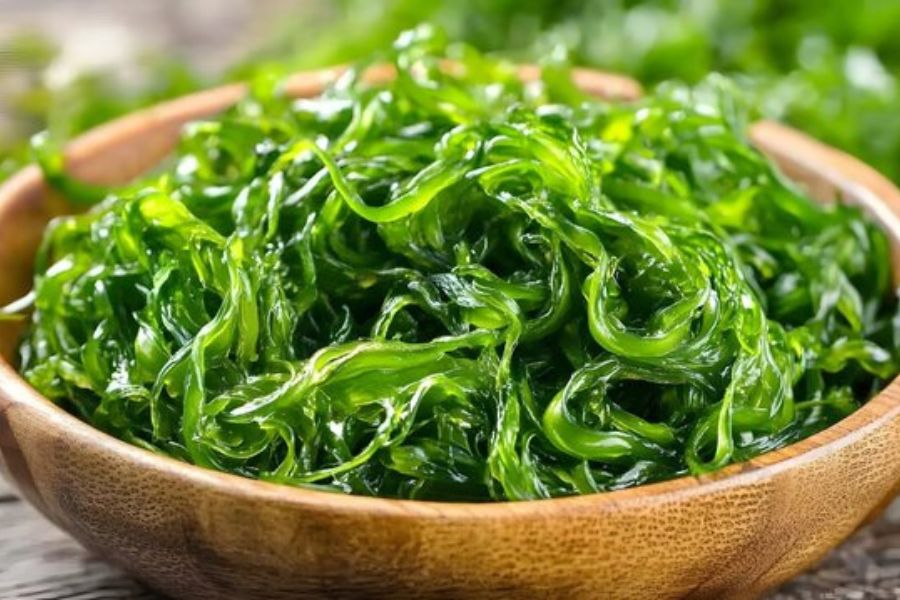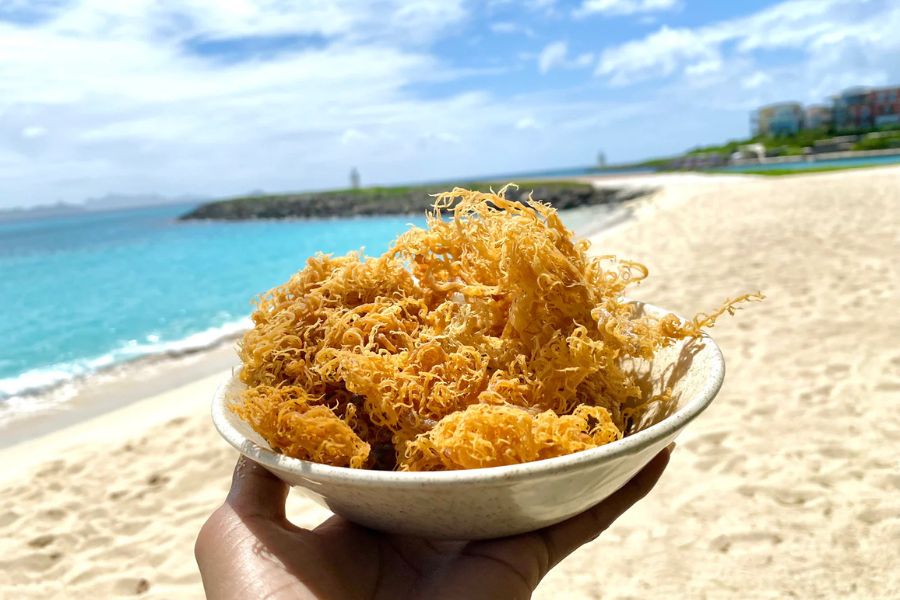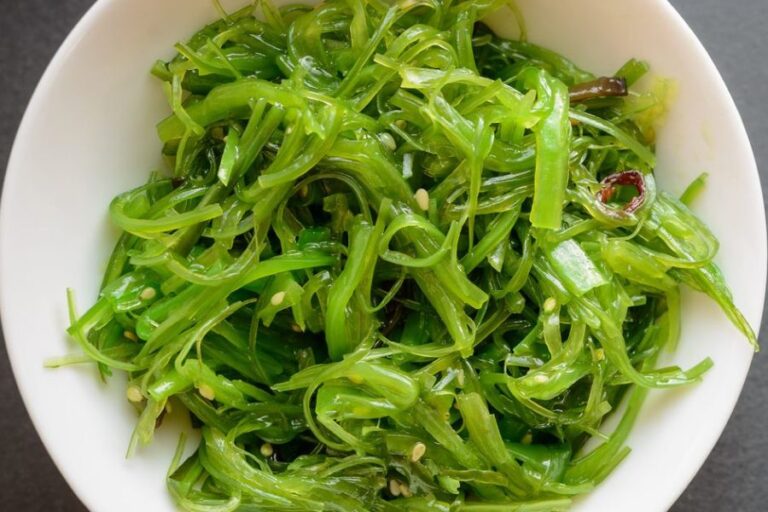Sea moss, also known as Irish moss, is a type of red algae that has gained attention for its potential health benefits. People often add it to smoothies, teas, or take it in capsule or gel form. Its appeal lies in its dense nutrient content, which includes essential minerals and bioactive compounds. Many believe it supports everything from thyroid health to skin hydration.
This article explains how sea moss affects different systems in the body, based on its nutritional makeup and reported benefits. While research is still developing, current evidence and traditional use offer insight into how it may support overall wellness.
Nutritional Profile of Sea Moss
Sea moss is valued for its rich concentration of essential nutrients. A small serving contains over 90 minerals, making it one of the most mineral-dense plant sources available. Some of the most important nutrients found in sea moss include:
- Iodine – vital for thyroid function
- Potassium – supports heart and muscle function
- Magnesium – involved in energy production and nerve signaling
- Calcium – important for bone health
- Iron – supports red blood cell production
- Zinc – aids immune function and wound healing
- B vitamins – help convert food into energy
- Vitamin C – supports immune health and skin repair
It also contains a type of soluble fiber called carrageenan, which gives it a gel-like consistency and may aid digestion. Sea moss is low in calories and fat, making it a nutrient-dense addition to many diets.
Supports Thyroid Function
One of sea moss’s most talked-about benefits is its role in supporting thyroid health. The thyroid is a small gland in the neck that regulates metabolism, energy levels, and hormone balance. It relies on iodine to produce key hormones like thyroxine (T4) and triiodothyronine (T3).
Sea moss is naturally high in iodine, a mineral many people lack, especially those who avoid iodized salt or seafood. Getting enough iodine from food sources like sea moss may help maintain proper thyroid function and reduce the risk of iodine deficiency.
However, it’s important to avoid consuming too much iodine. Excess intake can lead to thyroid dysfunction, including both hyperthyroidism and hypothyroidism. People with pre-existing thyroid conditions should consult a healthcare provider before adding sea moss to their routine.

Promotes Gut Health
Sea moss contains prebiotic fiber, which feeds the beneficial bacteria in your gut. A healthy gut microbiome supports digestion, nutrient absorption, and immune function. The prebiotic effects of sea moss may help reduce bloating, regulate bowel movements, and improve overall gut balance.
Carrageenan, a natural compound found in sea moss, also plays a role in digestive support. It acts as a thickening agent and may help form a protective lining in the digestive tract. This could offer some soothing effects for people with mild gastrointestinal discomfort.
However, some forms of processed carrageenan used in food manufacturing have been linked to gut irritation. The naturally occurring carrageenan in whole sea moss does not appear to have the same negative effects, but it’s worth sourcing sea moss from reputable suppliers to ensure purity and quality.
Strengthens the Immune System
Sea moss contains nutrients that support the body’s immune response. It offers a mix of vitamins, minerals, and antioxidants that help the immune system detect and respond to threats more effectively.
Vitamin C in sea moss supports white blood cell function and helps protect cells from damage. Zinc and iron also play important roles in immune defense, with zinc helping regulate immune cell activity and iron aiding oxygen delivery to cells.
Additionally, sea moss contains antioxidants that help reduce oxidative stress, which can weaken immune function over time. Some lab studies suggest sea moss may have antimicrobial and antiviral properties, though more human research is needed.
These qualities make sea moss a popular supplement for people looking to stay well during cold and flu season or to support general immune health.
Supports Skin Health
Sea moss provides nutrients that can benefit the skin both internally and externally. Its high content of vitamin C, sulfur compounds, and amino acids supports collagen production, which helps maintain skin firmness and elasticity.
When consumed regularly, sea moss may help hydrate the skin from within. Its antioxidants combat oxidative stress, which contributes to signs of aging such as fine lines and dullness. Some people also report clearer skin due to sea moss’s potential anti-inflammatory and antimicrobial properties.
Topically, sea moss gel is often used in skincare routines. Its soothing texture may help calm irritation, reduce redness, and support healing. It’s commonly applied as a face mask or added to lotions and serums.
Consistent use—whether eaten or applied to the skin—may lead to a smoother, more hydrated complexion over time.
May Improve Energy and Endurance
Sea moss may help support natural energy levels thanks to its blend of B vitamins, iron, and magnesium. These nutrients are essential for converting food into usable energy and maintaining healthy red blood cells, which deliver oxygen throughout the body.
Iron is especially important for people who struggle with fatigue or low stamina. Sea moss offers a plant-based source of iron that may help reduce tiredness in those with marginal deficiencies. Magnesium supports muscle function and helps regulate nerve signals, which can influence overall endurance.
While sea moss isn’t a stimulant, regular use may help reduce sluggishness by supporting better cellular function and energy metabolism. Some people also report fewer energy crashes and better physical performance after adding it to their daily routine.
Aids in Weight Management
Sea moss may support weight management in a few indirect ways. First, it contains soluble fiber, which helps promote a feeling of fullness. This can make it easier to manage portion sizes and reduce unnecessary snacking between meals.
The fiber in sea moss also slows digestion slightly, which can help regulate blood sugar levels and curb cravings. In addition, its iodine content supports healthy thyroid function, which plays a role in regulating metabolism.
Sea moss is low in calories but rich in nutrients, making it a useful addition to a calorie-conscious diet. While it won’t trigger weight loss on its own, it may support a balanced eating plan when combined with regular exercise and other healthy habits.

Supports Heart Health
Sea moss contains several nutrients that contribute to cardiovascular health. Potassium, in particular, helps regulate blood pressure by balancing sodium levels and supporting proper muscle function, including the heart muscle. A diet rich in potassium is often associated with lower risk of hypertension.
Sea moss may also have a mild effect on cholesterol levels. Some studies suggest that the fiber and antioxidant content in sea moss may help reduce LDL (bad) cholesterol while supporting HDL (good) cholesterol. While human research is still limited, its nutrient profile supports key areas of heart function.
Additionally, sea moss contains omega-3 fatty acids, which are known to support heart health by reducing inflammation and improving blood vessel function. Though the amount is relatively low, it can still contribute to overall cardiovascular support as part of a balanced diet.
Detoxification and Alkalinity
Some people use sea moss to support the body’s natural detox processes. It contains compounds that may help bind to and remove heavy metals and other unwanted substances from the digestive tract. While more human studies are needed to confirm this effect, its high fiber content does support regular elimination, which is essential for detoxification.
Sea moss is also believed to help balance the body’s pH levels. Although the body tightly regulates its own pH, eating foods classified as “alkaline” can reduce the acid load from processed and animal-based foods. Sea moss is often considered alkaline-forming due to its mineral content, particularly magnesium, potassium, and calcium.
While the science behind alkalinity claims is limited, adding sea moss to a diet rich in whole, plant-based foods may still contribute to overall wellness by supporting hydration, digestion, and mineral balance.
Risks and Considerations
While sea moss offers several benefits, it’s important to be aware of potential risks. The most common concern is excess iodine intake. Since sea moss is naturally rich in iodine, consuming too much can disrupt thyroid function, leading to either overactive or underactive thyroid activity. People with thyroid disorders should speak with a healthcare provider before using it regularly.
Another concern involves carrageenan, a naturally occurring compound in sea moss. Although whole sea moss contains unprocessed carrageenan, some processed forms used in food manufacturing have been linked to digestive irritation in animal studies. Choosing minimally processed sea moss helps reduce this risk.
Contamination is another issue. Sea moss absorbs minerals and compounds from its environment, including heavy metals and toxins if harvested from polluted waters. For this reason, it’s important to buy sea moss from reputable sources that test for quality and purity.
Lastly, some people may experience mild side effects such as stomach upset, especially when starting with large doses. It’s best to begin with a small amount and increase gradually if tolerated well.
How to Use Sea Moss Safely
To get the benefits of sea moss without overdoing it, it’s important to use it in moderation and choose clean, reliable products. The recommended daily amount typically falls between 1 to 2 tablespoons of sea moss gel or 500 to 1000 mg of dried powder or capsules, depending on the product and individual needs.
Sea moss is available in several forms:
- Raw, dried sea moss – must be soaked and blended into a gel before use
- Sea moss gel – ready to eat and easy to mix into smoothies, teas, or soups
- Powder – can be added to drinks, oatmeal, or baked goods
- Capsules – offer a convenient, tasteless option
When buying sea moss, look for products that are wildcrafted or organically harvested from clean ocean sources. Avoid sea moss that has been bleached or treated with preservatives.
If you’re new to sea moss, start with a small serving to see how your body reacts. Pregnant or breastfeeding women, as well as individuals with thyroid conditions or chronic illnesses, should check with a healthcare provider before adding sea moss to their routine.
Conclusion
Sea moss offers a wide range of nutrients that may support different areas of health, including thyroid function, digestion, immunity, skin, and heart health. Its high iodine and mineral content make it a popular supplement for people seeking natural ways to support their body’s daily needs.
While sea moss can be a valuable addition to a balanced diet, it’s not a cure-all. Safe use depends on proper dosage, high-quality sourcing, and individual health factors. When used mindfully, sea moss may contribute to overall wellness and complement other healthy lifestyle choices.
As with any supplement, it’s best to consult a healthcare professional if you have underlying conditions or are taking medication.
Frequently Asked Questions (FAQs)
1. What are the main benefits of sea moss?
Sea moss may support thyroid function, digestion, immunity, skin health, and heart health due to its high iodine, fiber, and antioxidant content.
2. How much sea moss should I take daily?
The typical dose is 1–2 tablespoons of sea moss gel or 500–1000 mg of powder or capsules per day. Always follow the instructions on the product label.
3. Can you take sea moss every day?
Yes, many people take sea moss daily. However, because it’s high in iodine, it’s important not to exceed recommended amounts.
4. Are there any side effects of sea moss?
Potential side effects include stomach upset or iodine overload if consumed in large quantities. People with thyroid conditions should use caution.
5. Can sea moss help with weight loss?
Sea moss may support weight management by promoting fullness and aiding metabolism, but it should be used alongside a healthy diet and exercise.
6. Is sea moss safe during pregnancy?
Pregnant or breastfeeding women should consult a healthcare provider before using sea moss due to its iodine content.
7. What’s the best way to consume sea moss?
Sea moss can be eaten as a gel, mixed into smoothies, taken as capsules, or added to foods like oatmeal and soups.
References
- WebMD. (n.d.). Sea Moss: Health Benefits and Side Effects. Retrieved from https://www.webmd.com/diet/health-benefits-sea-moss
- Healthline. (n.d.). Sea Moss: Benefits, Nutrition, and Preparation. Retrieved from https://www.healthline.com/nutrition/seamoss
- Medical News Today. (n.d.). What are the benefits of sea moss?. Retrieved from https://www.medicalnewstoday.com/articles/sea-moss
- Cleveland Clinic. (n.d.). 8 Potential Health Benefits of Sea Moss. Retrieved from https://health.clevelandclinic.org/sea-moss-benefits
- National Institutes of Health. (n.d.). Iodine: Fact Sheet for Health Professionals. Retrieved from https://ods.od.nih.gov/factsheets/Iodine-HealthProfessional/
- Healthline. (n.d.). Does Sea Moss Work for Weight Loss?. Retrieved from https://www.healthline.com/nutrition/sea-moss-for-weight-loss
- BBC Good Food. (n.d.). Top 5 health benefits of sea moss. Retrieved from https://www.bbcgoodfood.com/health/nutrition/top-5-health-benefits-of-sea-moss/
- National Geographic. (n.d.). Sea moss has become a billion-dollar health trend. Is it worth the hype?. Retrieved from https://www.nationalgeographic.com/health/article/sea-moss-health-benefits-effects
- Healthline. (n.d.). Carrageenan: Safety, Side Effects, and More. Retrieved from https://www.healthline.com/health/food-nutrition/carrageenan
- Verywell Health. (n.d.). 7 Health Benefits of Sea Moss and Side Effects. Retrieved from https://www.verywellhealth.com/sea-moss-everything-you-need-to-know-7481258
- Patel AK, Singhania RR, Awasthi MK, et al. Emerging prospects of macro- and microalgae as prebiotic. Microb Cell Fact. 2021;20(1):112. doi:10.1186/s12934-021-01601-7
- Lomartire S, Marques JC, Gonçalves AMM. An overview to the health benefits of seaweeds consumption. Mar Drugs. 2021;19(6):341. doi:10.3390/md19060341
- Academy of Nutrition and Dietetics. How to keep your immune system healthy.
- MedlinePlus. Thyroid diseases.
- Davani-Davari D, Negahdaripour M, Karimzadeh I, et al. Prebiotics: Definition, types, sources, mechanisms, and clinical applications. Foods. 2019;8(3):92. doi:10.3390/foods8030092
- Mazaheri Nia L, Iravani M, Abedi P, Cheraghian B. Effect of zinc on testosterone levels and sexual function of postmenopausal women: a randomized controlled trial. J Sex Marital Ther. 2021;47(8):804-813. doi:10.1080/0092623X.2021.1957732
- Bates JN, Kohn TP, Pastuszak AW. Effect of thyroid hormone derangements on sexual function in men and women. Sex Med Rev. 2020;8(2):217-230. doi:10.1016/j.sxmr.2018.09.005
- MedlinePlus. Parkinson’s disease.
- Pereira L, Valado A. The seaweed diet in prevention and treatment of the neurodegenerative diseases. Mar Drugs. 2021;19(3):128. doi:10.3390/md19030128
- Wells ML, Potin P, Craigie JS, et al. Algae as nutritional and functional food sources: Revisiting our understanding. J Appl Phycol. 2017;29(2):949-982. doi:10.1007/s10811-016-0974-5







